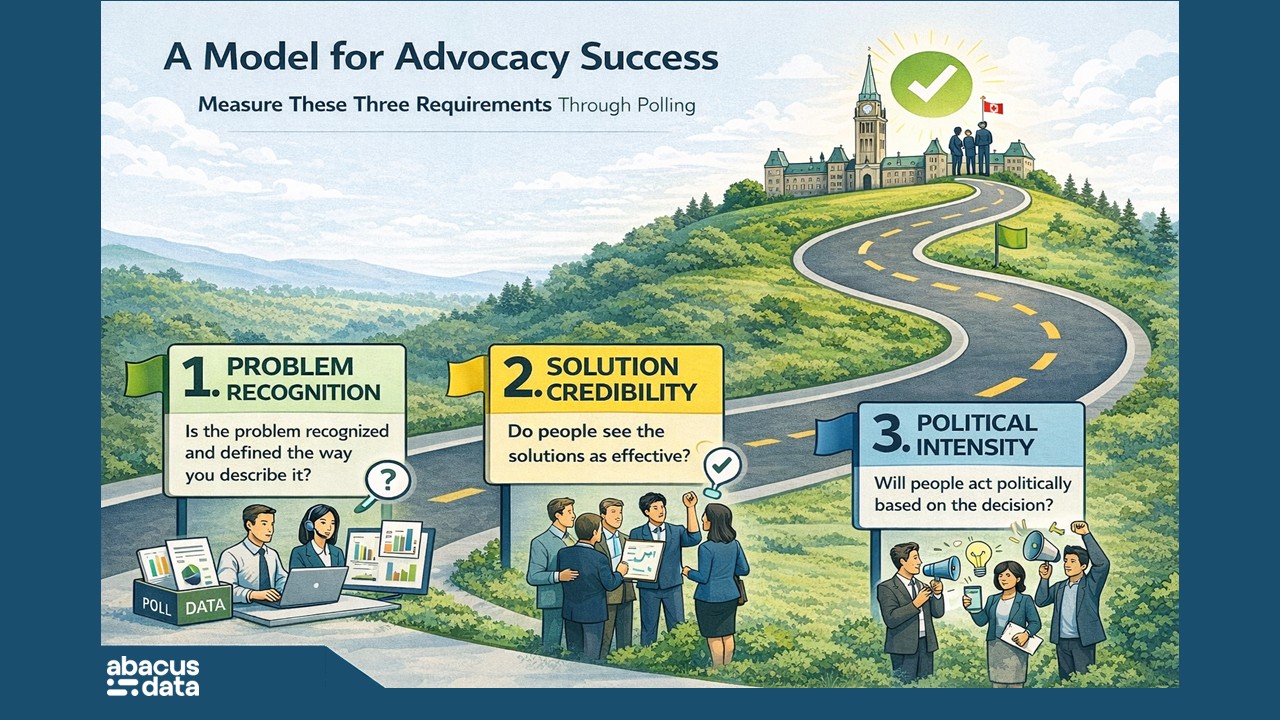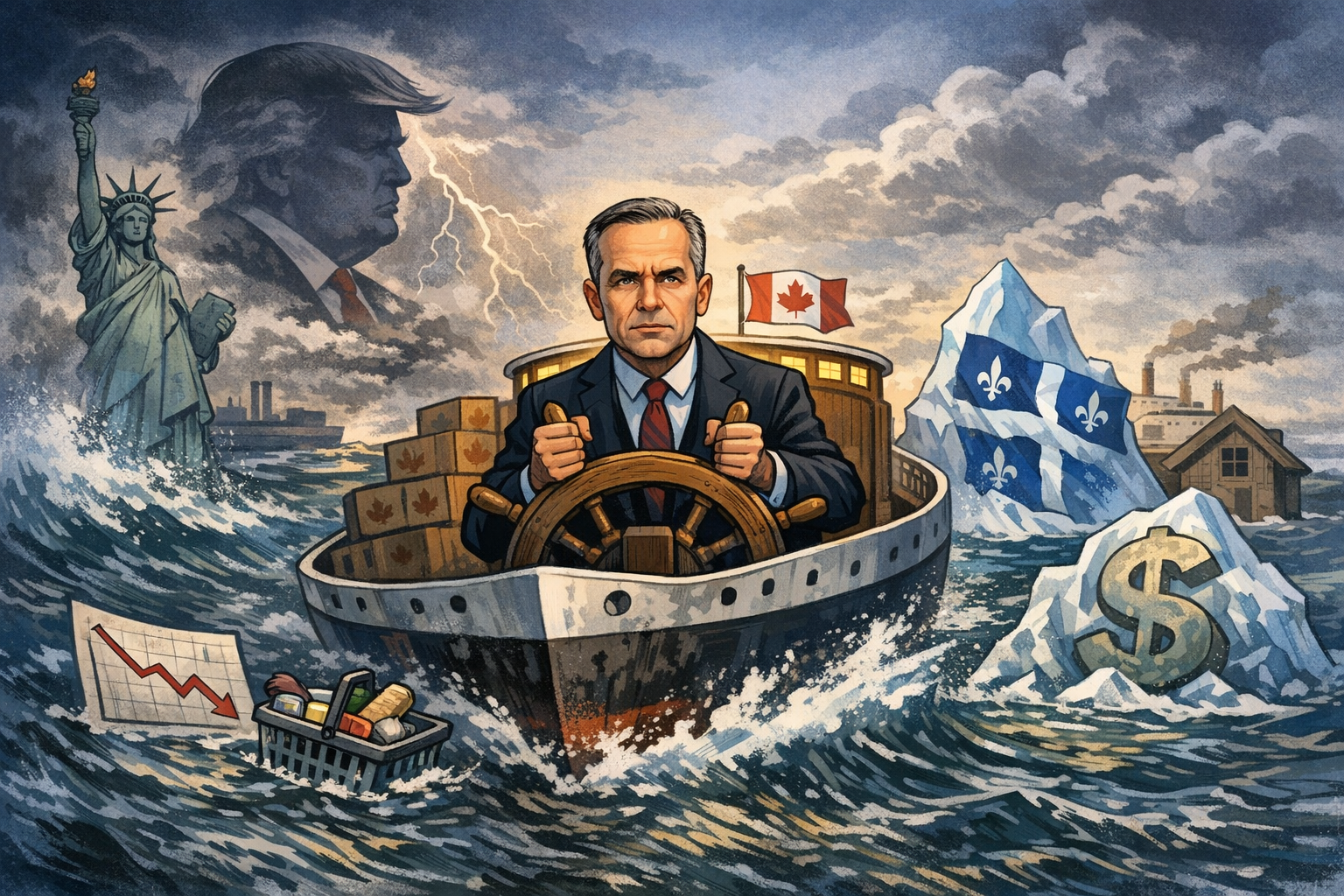BC NDP leads by 6 over the BC Conservatives as the gap closes from 18 to 6-points
May 14, 2024
From May 6 to 9, 2024, Abacus Data conducted a survey of 1,000 eligible voters in British Columbia exploring their views on provincial politics and government. This survey was a standalone survey in which questions about provincial politics came before any questions about federal politics. Stay tuned for results on the federal political questions.
If an election was held at the time of the survey, the BC NDP would likely win another majority government although the 18-point lead we measured in November of 2023 has closed to six points over the BC Conservatives.
The BC NDP has the support of 40% of committed voters, a four point drop from November. The BC Conservatives are second with 34%, up 8 while the official opposition BC United is at 13%, down 4. The BC Greens are at 10%, up one from our earlier survey.

Regionally, the BC NDP is ahead by 6-points in Metro Vancouver, by 15-points on Vancouver Island, and statistically tied with the BC Conservatives in the Interior and North.

Interestingly, the BC NDP is ahead by 15 points among those aged 45 and over, is tied with the BC Conservatives among those aged 30 to 44, and trail the BC Conservatives by 7 among those under 30.
The BC NDP leads by 11 among women (42% to 31% for the BC Conservatives) and a marginal 2-points among men (39% to 37% for the BC Conservatives).

Why is the NDP and Premier David Eby in such a dominant position?
British Columbians are generally more optimistic about the direction of their province than Canadians in other provinces. In our survey, 31% of British Columbians feel the province is headed in the right direction which is 6-points higher than how Canadians feel about their own country.
When asked about economic conditions in the province, 16% describe the economy as excellent or good, 33% describe it as acceptable, while 51% describe it as poor or terrible. There is a strong correlation between perceptions about the economy and vote intention. NDP supporters are far more likely to feel positive about the economy than those supporting the Conservative Party.

When we ask about incomes relative to the cost of living, we find widespread concern about incomes keeping up with the cost of living. 65% of British Columbians report their incomes falling behind the cost of living. There is little difference in views between those voting NDP or Conservative.


In terms of leader impressions, Premier Eby is by far the most popular provincial party leader. 40% have a positive impression (up 1 from November) while 27% have a negative view (up 2). In comparison, BC United Leader Kevin Falcon is net -15 with 19% positive and 34% negative. BC Greens Leader Sonia Furstenau is +2 with 24% positive and 22% negative while BC Conservative Leader John Rustad is -3 with 25% positive (unchanged from November) and 29% negative (up 2 from November). Despite a significant increase in support, BC Conservative Leader John Rustad’s personal image has not change much since the end of last year.
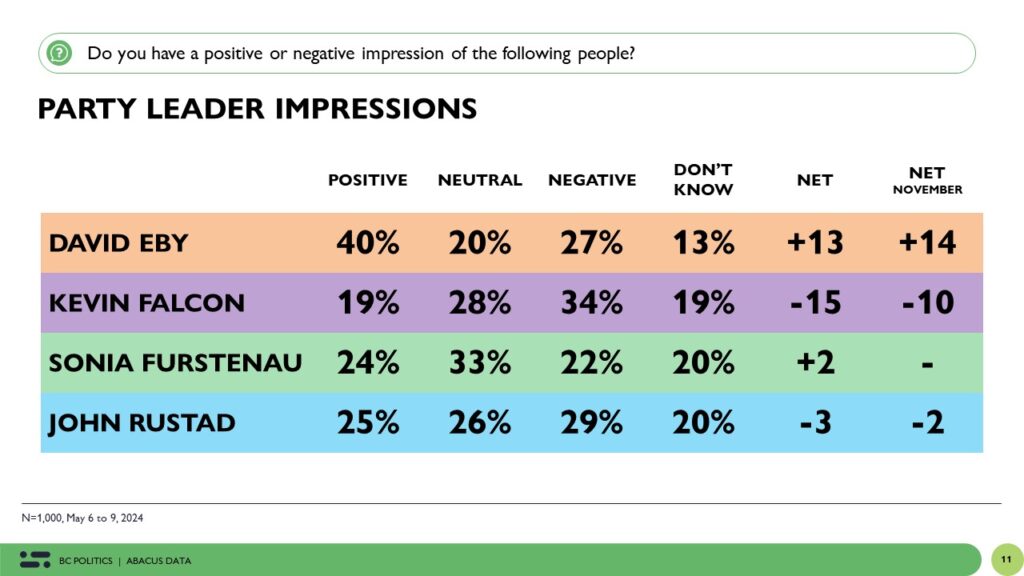
When we ask people to rate the three issues facing the province, the cost of living, housing, and healthcare are the top three issues. And they are the top three issues for all party supporters.
However, NDP supporters are more likely to rate housing, healthcare, and climate change as a top issue while Conservative supporters are more likely to rate the cost of living, drug addiction, taxes, and the economy as a top issue.
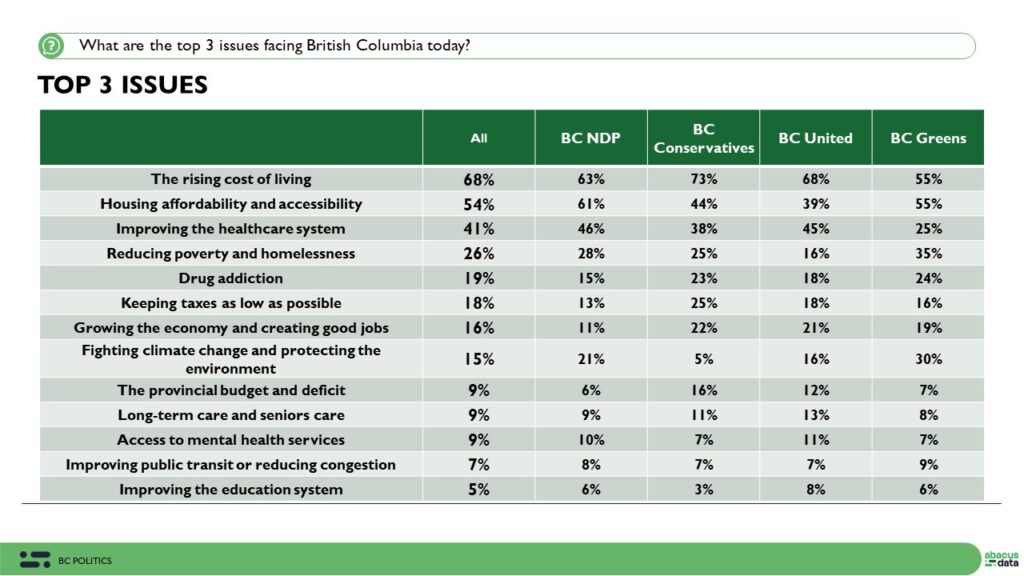
To anticipate how the ballot question in October might impact vote intentions, we cross vote intention by top issue.
The NDP has a big lead among those who rate housing, healthcare, reducing poverty, and climate change as a top issue. The Conservatives lead among those who rate taxes, the economy, and drug addiction as a top issue.
The NDP and Conservatives are statistically tied among those who rate the cost of living as a top issue.
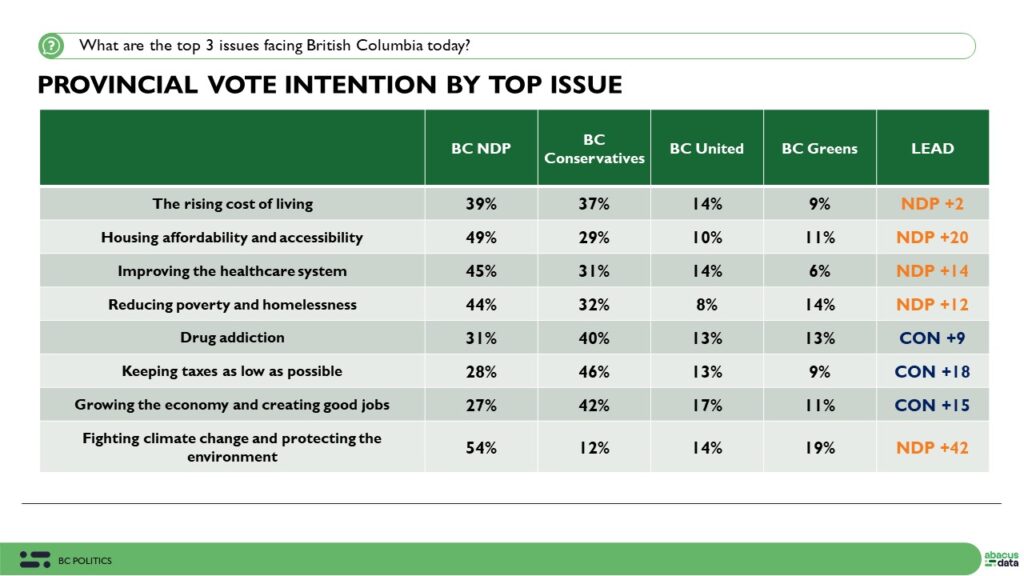
Finally, when assess the desire for change among the electorate, we find that 47% of British Columbians definitely want a change in government. Another 21% say they want change but it’s not that important to them. In contrast, 20% say they definitely want to see Premier Eby and the BC NDP re-elected while another 12% want the government re-elected but say it’s not that important to them.
When we compare these results to the final weeks of the 2022 Ontario election, the 2021 federal election, and the 2015 federal election, we find the intense desire for change is somewhat lower than in Ontario, and substantially lower than in the 2015 federal election. In fact, the results almost mirror the results in the 2022 Ontario provincial election – an election in which Doug Ford and the PC Party were easily re-elected.
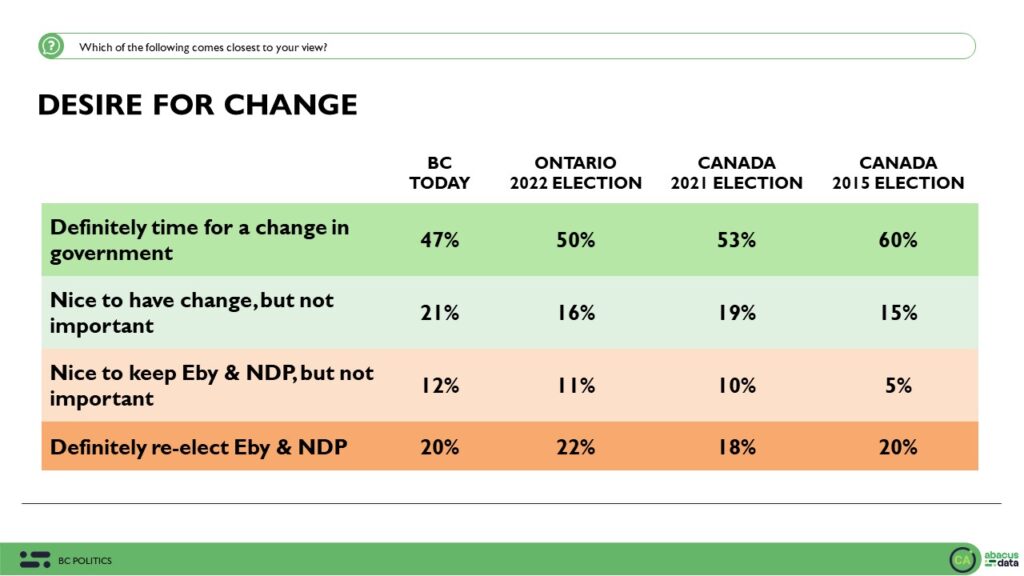
The Upshot
According to Abacus Data founder, Chair & CEO, David Coletto: Since November, we find a substantially shift in vote intentions. NDP support is down slightly while the BC Conservatives gave gained 8-points. The NDP is still ahead, but it’s a much tighter margin.
The NDP remains in a strong position, despite widespread concern about the cost of living and the direction of the province. Premier Eby has a net favourable impression – rare among incumbents in Canada right now and the NDP is seen as the best party to handle healthcare, housing, and poverty and it is tied with the Conservatives on the most salient issue – the cost of living. The NDP also has more support among older voters who are also more likely to vote.
The BC Conservatives have likely benefited from both the popularity of the federal Conservatives and also the difficult economic situation. But it’s leader John Rustad is no more known than he was at the end of last year. This lack of familiar is both a weakness and an opportunity.
BC United and Kevin Falcon continue to drop support and are now well back in third place and Mr. Falcon is the most unpopular leader in the province.
What looked like an easy NDP victory at the end of last year now looks more uncertain now.
Methodology
The survey was conducted with 1,000 eligible voters living in British Columbia from May 6 to 8, 2024. A random sample of panelists were invited to complete the survey from a set of partner panels based on the Lucid exchange platform. These partners are typically double opt-in survey panels, blended to manage out potential skews in the data from a single source.
The margin of error for a comparable probability-based random sample of the same size is +/- 3.1%, 19 times out of 20.
The data were weighted according to census data to ensure that the sample matched BC’s population according to age, gender, educational attainment, and region. Totals may not add up to 100 due to rounding.
This survey was paid for by Abacus Data Inc.
Abacus Data follows the CRIC Public Opinion Research Standards and Disclosure Requirements that can be found here: https://canadianresearchinsightscouncil.ca/standards/
ABOUT ABACUS DATA
We are the only research and strategy firm that helps organizations respond to the disruptive risks and opportunities in a world where demographics and technology are changing more quickly than ever.
We are an innovative, fast-growing public opinion and marketing research consultancy. We use the latest technology, sound science, and deep experience to generate top-flight research-based advice to our clients. We offer global research capacity with a strong focus on customer service, attention to detail, and exceptional value.
We were one of the most accurate pollsters conducting research during the 2021 Canadian election following up on our outstanding record in 2019.
Contact us with any questions.
Find out more about how we can help your organization by downloading our corporate profile and service offering.


